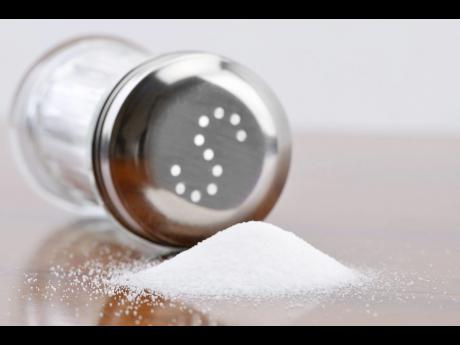Ounce of Prevention: Epsom salts to the rescue
MUCH IS said of the importance of well-known minerals like calcium, potassium, iron, selenium and zinc for good health.
Another important mineral, magnesium, is often disregarded, although it is the fourth-most abundant mineral in the human body, found mainly in bones, muscles and nervous system. The body uses it for more than 300 different metabolic processes.
Medical research shows that magnesium deficiencies may be widespread all over the world, and may contribute to many common disorders. Because only one per cent of the body's magnesium is found in the blood, it is difficult to detect a lack of magnesium by simple blood tests.
A high consumption of soft drinks, alcohol, animal fats and sugar depletes magnesium from the body. Prescription drugs like water tablets, some heart medications, antibiotics and steroids also increase magnesium loss. To make matters worse our modern water supply (including some bottled water), is lacking enough magnesium.
CONDITIONS RELATED TO MAGNESIUM DEFICIENCY
Asthma, heart attacks, high blood pressure, high cholesterol, irregular heart beat, chronic fatigue, chronic pain, constipation, depression, digestive disorders, insomnia, dizziness, irritability, nervousness, seizures, poor concentration, migraine headaches, muscle cramps and weakness, kidney stones, premenstrual (PMS) symptoms, menstrual pain, sugar cravings, and temper tantrums are just some of the conditions related to magnesium deficiency.
EPSOM SALT
Epsom salt is a mineral compound made up of magnesium and sulphate, known to chemists as magnesium sulphate. It got its name from a natural salt spring at Epsom in Surrey, England, and has been used for ages as a natural remedy for many ailments.
Both magnesium and sulphate are readily absorbed into the skin. This makes Epsom salt very easy to use. Many of the chemical functions regulated by magnesium, reduce inflammation, benefit circulation and improve muscle and nerve function. On the other hand, sulphates improve the absorption of nutrients in the body while helping to flush toxins. All the conditions listed above would benefit from Epsom salt, but let me specifically highlight some.
STRESS RELIEF
If you are stressed, you would have increased levels of stress hormones circulating and, at the same time, often deficient in magnesium. Epsom salt dissolved in warm water is readily absorbed through the skin to naturally improve the body's magnesium levels. Magnesium helps the body produce the anti-stress hormone, serotonin, relaxing chemical in the brain.
Magnesium helps insomnia, depression and anxiety disorders. Magnesium also helps improve energy levels by encouraging the production of ATP, the energy molecule in cells.
LOWER HIGH BLOOD PRESSURE
Magnesium plays a key role in naturally regulating blood pressure. Most people with hypertension are magnesium deficient. Expensive hypertension prescription drugs known as 'calcium channel blockers' prevent calcium from invading the walls of the blood vessels and elevating blood pressure. Inexpensive magnesium is nature's calcium-channel blocker.
Taking magnesium, via Epsom salt, soaks or supplements, plus a magnesium-rich diet including plenty of fruits and green vegetables, is often associated with a lowering of high blood pressure.
RELIEVE MUSCLE PAIN AND CRAMPS
Conditions that relate to increased muscle tension, including muscle cramps and stiffness, migraine and tension headaches, or even bronchial asthma, may well improve with soaking in an Epsom salt bath as it relieves both pain and inflammation. If your feet ache after standing all day, soak them in warm water with Epsom salt. It also helps neutralise foot odour.
ELIMINATE TOXINS
The sulphates in Epsom salt help to remove a variety of toxins including heavy metals and excess sodium from the cells, relieving inflammation and improve cellular function. Sweating after soaking facilitates detoxification and it is also helpful to drink extra water during and after the soak.
USING EPSOM SALT
Epsom salt comes as a crystalline powder and is inexpensive and readily available. Several factors affect the benefits you get from soaking in this mineral bath.
Skin exposure: The more skin is soaked in the bath, the better. Soaking most of your body in a bathtub is the best, but if that's not possible put your feet in a basin and bathe your legs and arms with the water.
Concentration: The more Epsom salts in the water the more potent the bath will be. Add one to three cups of Epsom salt to a full bathtub. Start with one cup if you are very ill. Use 1/2 cup for children under 60lb and 1 cup for children between 60lb and 100lb. For a foot bath use one tablespoonful per quart of water.
Temperature: The warmer the water, the greater the absorption of Epsom salt. So make the bath as warm as is comfortable for you. However, diabetics need to be careful not to unwittingly burn themselves as they often have impaired sensations, particularly in their hands and feet. If you are diabetic, have someone else, if possible, test the water temperature. Always err on the side of caution.
Length of bath: Twenty to 30 minutes is recommended, but if your body is fully immersed, you may need less exposed time.
Additions to the bath: Adding half a teaspoonful of vitamin C crystals will neutrailse any chlorine in the water. Half a cup of baking soda will make the water more alkaline. Add a few drops of an essential oil such as lavender to provide further relaxation.
In Jamaica, we are blessed with natural mineral springs whose waters are rich in magnesium and other minerals. Bath in St Thomas, Milk River Bath in St Catherine, and Rockfort Baths in Kingston are prime examples. Both locals and visitors should make full use of them.
- You may email Dr Vendryes at tonyvendryes@gmail.com or listen to An Ounce of Prevention on POWER106FM on Fridays at 8:15 pm. Details of his books and articles are available on his website www.tonyvendryes.com.

